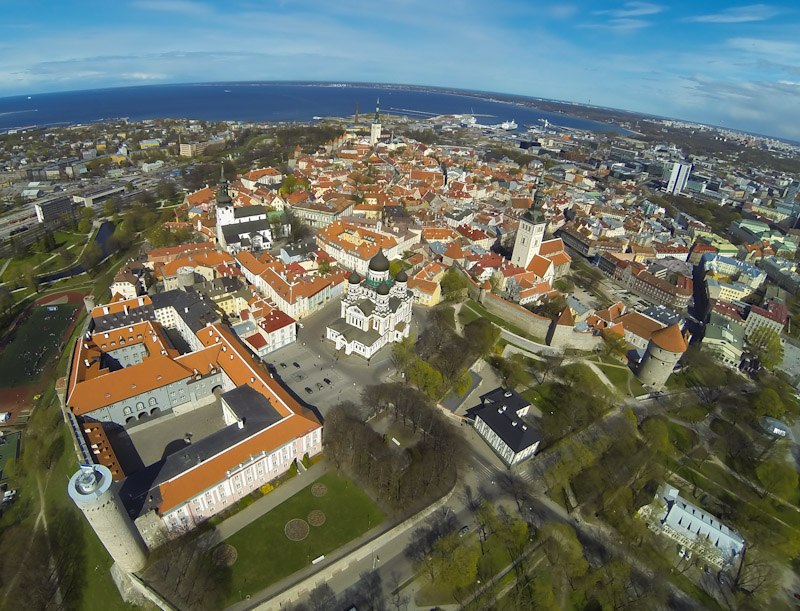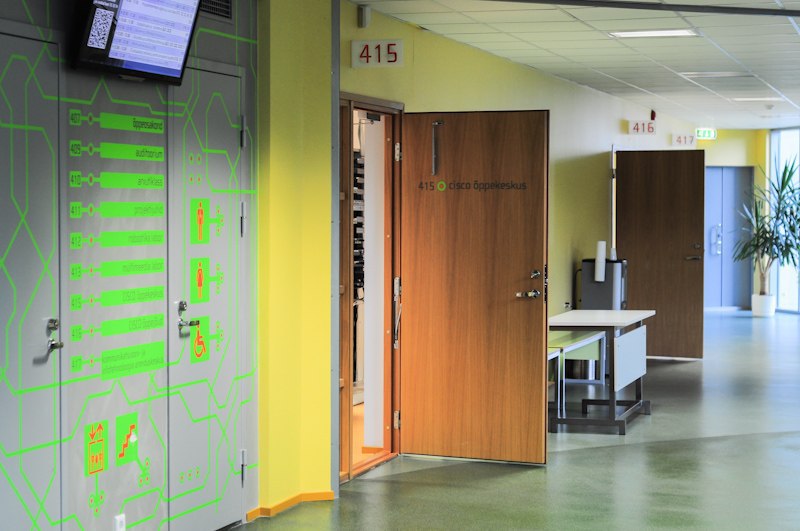How I went to teach in Estonia

[View of the old city from the height of the quadcopter's flight]
About me: He worked in St. Petersburg at the Polytechnic University. I taught computer networks, mainly within the Cisco Networking Academy, I have the statuses of CCNA R & S, CCNA Security, CCNP R & S, and I am also an Instructor Trainer for the relevant courses.
Prehistory
I liked teaching at the Polytechnic: the lack of a tight schedule, the lack of direct bosses, excellent pay, plus tremendous opportunities for freelancing, so I did not even think about changing jobs.
Preparations for relocation began in about a year. Although how to say “preparation”, my wife and I did not plan to leave, but it was somehow uncomfortable to keep free cash in rubles, even on deposits. Therefore, it was decided to invest free money in real estate. For St. Petersburg real estate funds are categorically not enough. It was possible to look towards the Russian regional centers, but somehow I really didn’t want to get involved with it. Tallinn and Helsinki were on the list of more or less large cities, but we didn’t like Helsinki too much, it’s boring, everything is expensive and not clear, but the capital of Estonia made a very good impression. Quick analysis of prices for apartments on the Internet, and the decision is made, we invest in real estate in the EU area! A little more than a million rubles (the euro was then worth less than 43 rub.) We managed to buy a studio in a Stalin-era house 500 meters from the sea beach and 40 minutes on foot from the Old Town.
')
Since my wife and I didn’t have a strict work schedule from 10 to 19, we spent some of the time last year in Tallinn, went to St. Petersburg to work and, in general, this situation suited us perfectly.

[Sunset from our beach]
Almost immediately, I posted a resume on Estonian job search sites, but not to find something, but to see what they would offer, to study the market, so to speak. And ... for the year, not a single call or letter, only an automatic mailing of collections of vacancies, possibly suitable for me.
How it all began
In mid-May of this year, I accidentally stumbled upon a university vacancy, they needed an instructor from the Cisco Academy, the text of the vacancy was posted in a picture and only in Estonian, although most of the proposals are published in at least 2 languages. That is, neither by keywords nor in automatic compilation was it to be found. Not a word about wages or working conditions, only the requirements for the candidate, for which I approached perfectly. Well, the resume sent. Almost immediately, I wrote a letter asking if it was normal that the resume was in English; I was told that everything was fine.
A few weeks of silence, at this time I am completely bogged down with work at the Polytechnic, and somewhere in the middle of June after lunch I receive a letter: we are waiting for you tomorrow at 10 am at the university for an in-person interview. 2 minutes to check the availability of bus tickets from St. Petersburg, and I write the answer “See you tomorrow!” I really didn’t want to postpone the meeting, you never know would fail. That evening, right after work, I take the bus to be in Tallinn at 4 am.
Before the interview, I was not very worried, because I already knew some of the interviewers. Here you need to make a small digression. When I travel close to some well-known network academy, I try to arrange a meeting and visit, to share experiences, and just interesting. It was the same here: as soon as we bought an apartment a year ago, I went to visit and met the head instructor. We then spent half a day discussing the problems of teachers, students, the learning process as a whole, and parted in fairly good relations.
Back to the job interview. It was attended by the rector, the same chief instructor, he is the head of the network academy and the teacher, whom I had to replace. However, the interview was difficult to call, it was more like a conversation for life. As it turned out, they had previously asked to give me a small feedback on the manager of the Cisco academies in central Europe and Russia. It so happened that I knew him personally and we even met a couple of months before this point and discussed some problems of the academies. Needless to say, the review was good. On the same day in the evening I was again in St. Petersburg.
A day later they wrote to me that they invited me to sign a contract! A bus ride in the same way and even somehow became insulting, because the signing of the contract took no more than 10 minutes. For comparison, in order to get a job as a teacher at the Polytech, it is necessary to spend almost a whole day on the rush from office to office, collect a mountain of signatures and stamps, and the offices are located in different buildings, and the university is quite impressive, in addition, no one canceled lunches and tea parties. This was my first encounter with the Estonian bureaucracy, in general, I was pleased.
Anyone can work in Estonia if he has a legal right to reside in the country. Even a tourist visa will do. At first I didn’t believe it and asked HR to clarify this question. The Police and Border Guard Board replied that yes, you can work with such a visa, but not for long, because it does not give the right to live in the country for more than 90 days in the first half of the year. In addition, the fact of such work must be registered in the same department.
After signing the contract, it is registered at the police and border guard department. It is written that the registration process takes 10 days, but everything was ready for me the next day. After registration of the contract, you can already begin work and apply for a residence permit. The residence permit is done 2 months, but I was ready in 1.5 weeks.
The process of obtaining a residence permit
In Russia, I am afraid of such institutions. I imagined narrow corridors, crowds of people, small loopholes for communication with employees. There was also the fear that they would not want to speak with me in any language other than Estonian, which I did not know. But how wrong I was. The room for submission of documents is more like a bank office, employees sit around the perimeter at the tables and they just need to sit down. Everyone speaks at least 3 languages and is very friendly.
To obtain a residence permit itself, you need to bring a fairly large stack of documents, mainly questionnaires, including those filled by the employer. A full list of documents can be found on the police website . No certificates of good conduct or anything like that are required. The process of collecting and submitting documents is very simple, but not for everyone. There are certain categories of people with simplified requirements: these are teachers and lecturers, circus performers, military, creative professions and highly paid specialists (the salary must be more than the national average by a certain coefficient). All these people are not required to obtain permission from the Estonian Unemployment Insurance Fund. But since the average salary in the country is not big, it’s not a problem to become a highly paid specialist, especially in the field of IT. Readiness of residence permit documents is reported via e-mail.
Because of the speed of my residence permit, I was ready in July, although I started working only in August. It seemed to me that everything was so easy because recruiting teachers from other countries was common, but later found out that I was the first foreigner in the last 14 years.
Some words about impressions
Atmosphere at work
There is an atmosphere of total friendliness. In the Polytech there was - universal severity. There is no such thing as a teacher above a student. The teacher, rather, helps to learn, and does not teach directly. And the atmosphere here is monitored specifically, I was told that this educational institution was very much appreciated for her, and she didn’t do it herself, but they did it, although I didn’t understand how. For example, teachers go to student parties and light there as well as students.
Open door policy
For me it has become a real discovery. No turnstiles, checkpoints, anyone can go anywhere. It is possible to determine whether the teacher or the rector can be by the open door. The door to our office does not close, even when the teachers left for lectures, for example.
In the first week of my work, people just came to meet me, just like that! It was crazy, because at the Polytech, for example, after several years of work, I didn’t even know the names of most of my colleagues.
Students often come to the teachers just to talk about problems, sometimes not even related to the educational process. Or a student who does not learn from me in any of the courses can come in and ask for something, ask for advice or ask about my subject. In the Polytech, we had 2 teachers, both behind huge armored doors with magnetic locks. It was very often possible to see students, the guarding teachers near these doors, and asking the passing teachers whether they have the right person inside.

[Hall]
Tongue
I actively learn Estonian, but in fact it is not very necessary here. Ignorance of the state language is not something that does not cause problems, it does not even cause inconvenience. Most people speak 3 languages, advertising is duplicated in Russian, almost all sites are available in 3 languages, including the state. People are absolutely calm about the Russian language. I often have situations when I start speaking Estonian, and the other party immediately answers in Russian, instead of Estonian.
Theoretically, university studies should be conducted in the state language, but if there is at least one exchange student in the stream, for example from Finland, then the entire course is in English. The head of our academy, an American, has been living here for more than 14 years, but he never knows Estonian. Everyone wants to train their English with a native speaker and do not speak Estonian.
About half of our colleagues we agreed to communicate in Russian, with the rest in English, at first I constantly got confused until I remembered. Before the semester there was a meeting of teachers and at the very beginning there was a phrase that not all those present understand Estonian, so let's hold a meeting in English. Communication with students in the same way, with someone in Russian, with the rest in English. Lectures in English.
I would like to say a few words about the local Russian language, it is not the same here as in Russia. It seems that somewhere in the 90s they made an impression of the language and use it without any changes. You can hear such expressions and momentum, which I used in childhood, then it was considered cool. At the same time, there are a lot of borrowed words, and people are not always aware of this. At first, it was somewhat strange when I was asked to contact the Tele2 office or pay at any Swedbank office.
[Example of an agreement of my Internet provider]

[Ads are often duplicated]
Low bureaucracy
Everything is done quickly, most operations can be carried out via the Internet. For example, to get a certificate of registration of ownership of real estate in Russia, I had to take a queue at 5 am and spend the whole day in a narrow corridor, here I got all the documents for an apartment by email a few weeks after the transaction.
I registered in my apartment via the Internet, designed benefits for free public transport via the Internet too. At work, if you need to sign something, they drop pdf to me in the mail, I sign it with my ID card, which is my identity document, and send it back.
Free public transport
Totally. And not only buses, trolley buses, trams, but also ferries to the nearest island and train within the city limits. True, this is only for residents of the city. The organization of transport is great! The transport runs strictly according to the schedule, there is the site soiduplaan.tallinn.ee , where all the buses on the city map are displayed in real time, there are all the schedules, route planners, etc. You can plan your arrival anywhere in the city - + 2 minutes. Where theoretically there may be traffic jams, there are dedicated lanes for public transport. In the city center there are places where 2 of 3 lanes are allocated for public transport. Transport so much and he goes so often that often even at rush hour you can go sitting. But there are also disadvantages in gratuity - homeless people actively use transport, which is not very pleasant.
Security
At first it was very unusual for me to see small children with large backpacks alone on the street or in transport, but now I understand that this is normal. Not afraid to walk the streets at night, even on Friday or after public events.
Electric cars
There are a lot of them here! In Estonia, fully prepared infrastructure for them. Refueling a lot, great benefits for the owners. The most amazing thing is that electric cars can be rented, and for this you do not need to communicate with people. Paradise for a sociopath! I signed up on the site, signed the contract with an ID card, then just walked over to the car (their parking lots were scattered throughout the city) and opened the doors with the help of a telephone. Payment is hourly, the bill arrives at the end of the month.
Little about the shortcomings
Life is generally more expensive. Although the products and cheaper (and better), but a communal, electronics, furniture, gasoline significantly more expensive. Especially upsets the size of the fee for barely warm batteries. In the studio, only for heating can get 100 euros, in the treshka with colleagues more than 200 happens.
Boring The city is small, nothing special, epic happens, everyone lives a measured, slow life. Of course, there are plenty of events here: concerts, exhibitions, excursions, film screenings, but this all goes smoothly, peacefully and orderly. There is no constant rush, problems arising from nowhere, annoying factors, some kind of chaos. I would never have thought that this might be missed, but the fact remains. A colleague compared a trip to Tallinn with a jump from a tower into a pool, but instead of water you get into a jelly.
The standard of living is lower. It is felt that people do not live richly. Many alcoholics, sometimes when you walk down the street feeling like in the 90s hit. You can meet a lot of people who have not met for about 15 years in Russia - drunken, slouching, in sweatshirts or track suits. Many collectors of bottles and the homeless. Although maybe I just live in this area.
Parcels Are subject to duties if their value is more than 22 euros. And it does not matter what is written on the package itself, you need to confirm the fact and the amount of payment through the bank. All that is more expensive, you need to declare, however, for this, too, do not go anywhere, and everything can be done via the Internet. It should be noted that the country is small and the market is also small, the fact that in Russia you can find and buy without problems, it may simply not be sold or sold, but very expensive.
A trifle, but for flying on a quadcopter, you need to get permission from the civil aviation authorities (you can translate it somehow), but again, you don’t need to go anywhere. It is necessary to write them a letter with the time and place of flight, they write in the reply letter - it is allowed within a certain height, within a certain radius.
Conclusion
I read a lot of articles about changing the country of residence and was always amazed how difficult it was, but I was convinced from my own experience that this could be not just easy, but very easy. A change of residence did not require from me a large amount of nerves, nor time or financial resources.
In the following articles I want to compare the training systems in Europe and Russia and reveal the technical side of the issue. To look at the differences in education systems not from the student’s side, but from the teaching side. There are a lot of interesting technologies applied in education, but there are also things that I really miss.
Source: https://habr.com/ru/post/285672/
All Articles